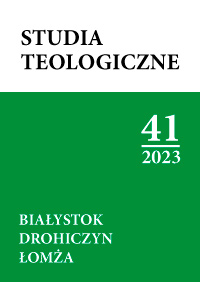Dojrzewanie wiary. Zarys rozwoju świadomości Kościoła w zakresie prawd wiary, w świetle proroctwa Ewangelii
The maturation of faith. An outline of the development Church’s consciousness of faith’s truths in the lens of Gospel prophecy
Author(s): Krzysztof PolakSubject(s): Christian Theology and Religion, History of Church(es), Systematic Theology, Sociology of Religion
Published by: Kuria Metropolitalna Białostocka
Keywords: council; church; Spirit; prophecy; history; truth; faith; maturation;
Summary/Abstract: Although Jesus Christ conveyed the fullness of the revealed truth to his Apostles, he also predicted that in the future it would be discovered and deepened fully, with the help of the Spirit of Truth. This hence the question: to what extent is the history of the Church a process of deepening the understanding of the apostolic faith? The witnesses of the New Testament Revelation were simple people - fishermen, farmers, craftsmen, officials - originating from the environment of Palestinian Judaism. They bravely professed the Christian faith given to them and did not hesitate to seal their testimony with the martyr’s death. The faith of the Apostles and martyrs had a great power of persuasion, which caused the community professing it constantly expanded and established itself in the areas of Hellenistic and Roman culture. In the first point, I analyze the collision of the Gospel, originally preached in the biblical language, with Hellenistic and Roman cultures, which led to its crisis. It was overcomed at the councils of the first millennium, where the biblical faith in God was expressed in the language of ancient Greek philosophy. On the other hand, faith in the Church is a derivative truth, which Christians did not treat with such seriousness as they referred to the main articles of faith in God. In the second point, I show that for many centuries in the Roman Catholic Church, the understanding, what the Church is, was reduced almost without exception, to institutional aspects, which aroused opposition. Especially in modern times, after the Reformation controversies about the understanding of the Church intensified. Only in the second half of the 20th century, during the Second Vatican Council (1962-1965), a rich teaching about the Church was formulated, which overcame the previous defects. In the third point, I synthetically present the teaching of Lumen gentium, the main document of Vatican II. It draws from biblical and patristic sources, as well as from the achievements of the Church’s tradition, develops the messages contained therein and presents a rich synthesis of the value of dogma. The Apostles’ faith in God is deepened – the history of the Church proves of that. This is done by expressing the faith in the language of non-biblical cultures and philosophy. On the other hand, for centuries faith in the Church was reduced to institutional aspects, which caused disputes and divisions among Christians. However, even in this area, an overcoming of one-sidedness and a deeper understanding of the nature and mission of the Church was achieved. In these historical processes, we can see the fulfillment of the prophecy of the Gospel of St. John about the Spirit of Truth, whom Jesus sends to his Church to help him discover the full truth.
Journal: Studia Teologiczne Białystok Drohiczyn Łomża
- Issue Year: 41/2023
- Issue No: 1
- Page Range: 97-118
- Page Count: 22
- Language: Polish

